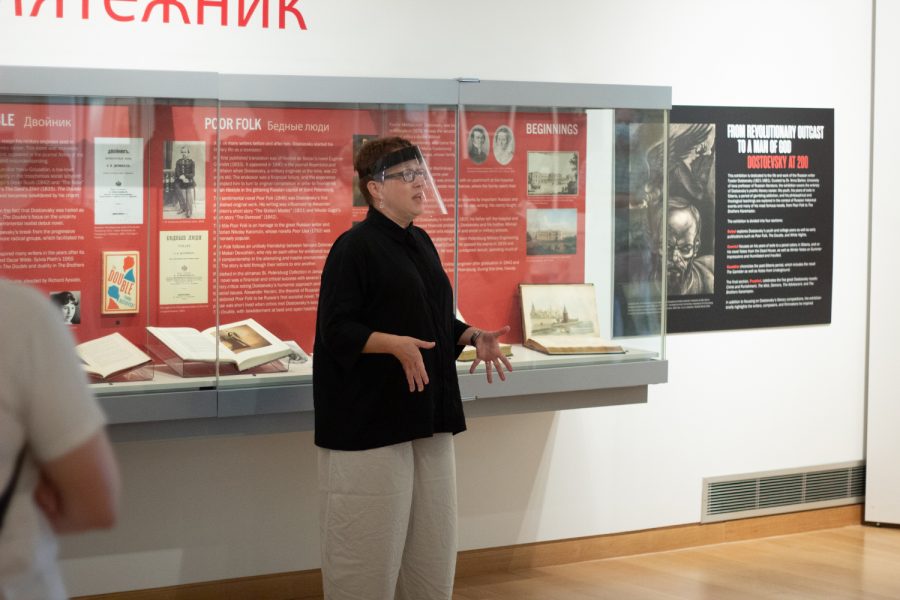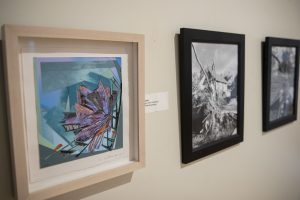Dostoevsky at 200: Mortal Man, Immortal Lessons
Anna Barker, the curator of the Dostoevsky exhibition currently housed in the Main Library, led a tour on Saturday for museum patrons. She took the visitors on a journey through literary figure Fyodor Dostoevsky’s life and legacy.
University of Iowa professor Dr. Anna Barker guides visitors through famed Russian author Fyodor Dostoevsky’s life at the University of Iowa Main Library Saturday, Aug. 28, 2021.
August 31, 2021
Fyodor Dostoevsky is a man who understood the power of duality, of the innate good and bad in all of humankind, and a large part of his legacy is on display at the University of Iowa’s Main Library in an exhibit titled, “From Revolutionary Outcast To A Man Of God: Dostoevsky At 200.”
Dostoevsky was a Russian literary icon who wrote classic novels such as Crime and Punishment and The Brothers Karamazov. In a special weekend tour with the curator, Anna Barker, visitors to the exhibit were given an opportunity to understand Dostoevsky’s life story and the themes that he spoke to in his works.
Barker is an adjunct professor in the Asian and Slavic Languages and Literature department at the UI, and some of the classes she teaches are centered completely on Dostoevsky and his books.
Barker said the exhibit was curated with the deliberate intention to be relatable to students and the public and was brought to life through the efforts of her and Sara Pinkham, the library’s exhibition and engagement coordinator.
The exhibit is split into four sections that represent the four eras of Dostoevsky’s life, titled, “Rebel,” “Convict,” “Gambler,” and “Prophet.” Each section of the exhibit showcases his books, quotes, influences, and some of his personal and familial history.
Dostoevsky’s rebel era was his first, when he was considered bright eyed, bushy tailed, and heavily interested in activism in Russia. Next was his convict era, when he and his rebel group were brought in by the Czar and kept as prisoners in Siberia for his political efforts against the Russian regime.
His gambler era highlighted the time when he was newly free from prison and fell into debt, grew addicted to gambling, and lost his way. Finally, during his prophet era, he wrote his most introspective novels and became the spiritual advisor to the heir to the Russian throne.
In a whirlwind tour, Barker led the group around the gallery, trying to fit in as much as she could about the man in only an hour. She checked her watch regularly, seemingly trying to keep her excitement in check as the time flew by.
She also touched on what made Dostoevsky so meaningful to her and her students.
“With uncanny and unflinching insight, [he] managed to depict the totality of humanity, never shying away from the horror concealed in the human soul, but always keeping faith in the light,” Barker said.
When elaborating on his legacy again, she went deeper.
“Do we have three weeks to talk about this?” she said with a laugh.
Despite being from the 19th century, Barker said the themes of Dostoevsky’s work still ring true, as the core of humanity hasn’t really changed.
Thus, his work has lived on and become classic in the eyes of the Western world.
“He extends a hand to all of us who are seeking and striving, to all the people who have doubts, and to all the people who are in disbelief about how incomprehensibly unfair the world is,” she said.
The exhibit serves as a reminder of the light to be found in all of it.
“He was so incredibly earthly, so incredibly human, so incredibly flawed, that he understood that human beings cannot be judged, and that human beings are redeemable,” Barker said. “That has never changed, precisely because they are human, not because they strive or because they do good deeds, and especially not because they are compelled to be good, but they’re irredeemably human because they are human.”
The Dostoevsky exhibit will remain open all semester in the library. It can also be viewed virtually.




